Have you noticed a foul smell similar to rotten eggs coming from your washing machine? This issue is fairly common and typically stems from a combination of factors, including bacteria build-up, stagnant water, and residue inside the machine.
This guide on why does my washing machine smell like rotten eggs, I’ll explore the causes behind this unpleasant odour and explain why it happens in washing machines.
What are the Common Reasons Why Your Washing Machine Smells Like Rotten Eggs?
Reason 1: Build-Up of Bacteria and Mould
A major cause of the rotten egg smell in washing machines is the build-up of bacteria and mould. Washing machines provide an ideal environment for these microorganisms due to the combination of moisture, warmth, and organic matter (from clothes, dirt, and detergent residue).
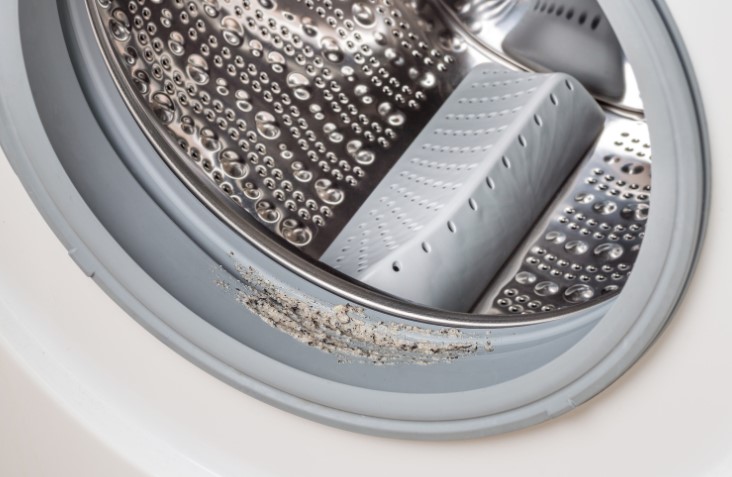
Why does this happen?
- Warm, damp environment: Washing machines are moist after each cycle, especially if the door is closed, trapping water inside.
- Organic matter: Dirt, hair, skin cells, and soap residues left behind from clothing create a breeding ground for bacteria.
- Hydrogen sulfide production: As bacteria break down these organic materials, they release gases, including hydrogen sulfide, which smells like rotten eggs.
Where does bacteria and mould accumulate?
- Drum: Inside the drum where clothes are washed, bacteria can hide in the corners, around the edges, and even on the metal surface.
- Detergent drawer: Residue from liquid detergent or softener can create a sticky film where bacteria grow.
- Door seals: Mould often accumulates around the rubber gasket of front-loading machines, where water can get trapped.
How to identify this issue?
- A musty, damp smell every time you open the washing machine door.
- Visible black or grey spots of mould around the door seal.
Reason 2: Stagnant Water in the Drum
Another common reason for the rotten egg smell is stagnant water sitting in the machine after a wash cycle. This stagnant water provides a perfect habitat for bacteria to multiply, causing the foul odour. Now its the time to know the importance of removing stagnant water smell from washing machine.
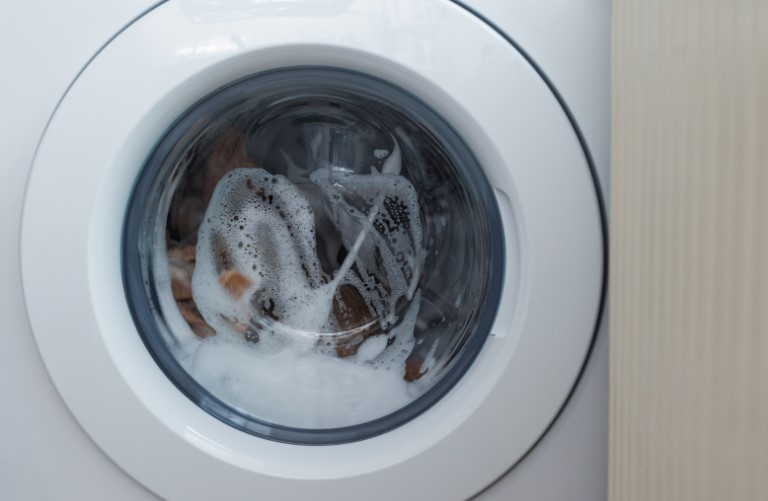
How does stagnant water occur?
- Incomplete drainage: If your machine is not draining properly after a cycle, water can pool in the drum or hoses. This water, when left to sit, becomes contaminated with bacteria and sulphur compounds.
- Infrequent use: If the washing machine isn’t used regularly, water can remain in the drum or hoses for an extended period, leading to stagnation.
Why stagnant water causes the smell?
- Stagnant water becomes a breeding ground for bacteria, which in turn release gases such as hydrogen sulfide (the sulfur-like rotten egg smell).
- Over time, the bacteria multiply, and the smell becomes stronger.
How to identify this issue?
- Water pooling in the drum after a cycle.
- Bad smell lingering inside the drum even after a wash.
Reason 3: Drainage Issues and Blockages
Problems with your washing machine’s drainage system can also be a leading cause of smelly washing machines. Blockages in the drainage pipes or hoses prevent water from flowing out properly, leaving dirty, bacteria-ridden water to stagnate.
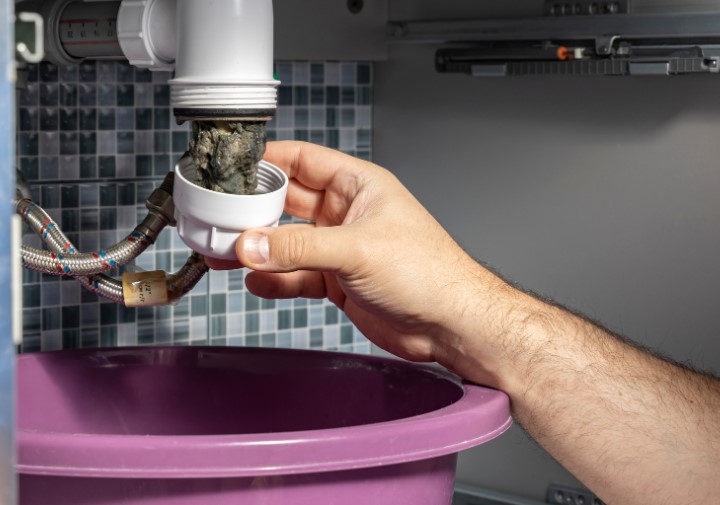
What are Common drainage issues?
- Clogged drain hose: The drain hose can become blocked with lint, dirt, or even small items of clothing. This blockage prevents water from being expelled properly, leaving foul-smelling water inside the machine.
- Blocked drainage pump: Over time, the pump can get clogged with debris, reducing its ability to drain water effectively.
- Plumbing issues: Occasionally, the problem may lie deeper in your home’s plumbing, causing the washing machine to back up with foul-smelling water from other household drains.
How drainage issues lead to bad smells?
- Water stagnation: Water that can’t exit the machine remains in the drum or pipes, causing bacteria to grow and release foul odours.
- Sulfuric gas emissions: If the blockage is severe enough, it can lead to the build-up of sulfuric gases, contributing to the rotten egg smell.
How to identify this issue?
- Slow drainage or water remaining in the drum after a cycle.
- Gurgling or bubbling noises during the draining process.
- Persistent bad odour that worsens after each wash.
Reason 4: Soap Scum and Detergent Residue Build-Up
Excessive use of detergent or fabric softener can lead to a build-up of soap scum inside the machine. This residue can mix with dirt, lint, and organic material from clothes, creating the perfect environment for bacteria to grow and produce bad smells.
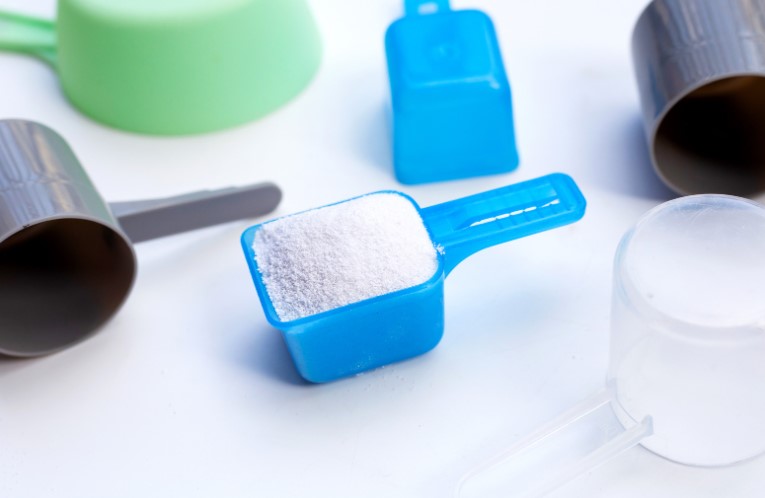
How does detergent residue cause odours?
- Overuse of detergent: Using too much detergent leaves excess soap in the drum and hoses that doesn’t get rinsed out fully. Liquid detergents, in particular, are prone to leaving a film behind.
- Fabric softeners: These can leave a waxy coating inside the drum or in the dispenser drawer, trapping dirt and bacteria.
Why does residue build-up leads to bad smells?
- Bacteria growth: The film created by soap scum holds onto moisture, providing the perfect conditions for bacteria to thrive. The bacteria then release gases that cause the rotten egg smell.
- Decomposition of soap: When detergent and softeners break down, they can produce foul-smelling byproducts, further contributing to the bad odour.
How to identify this issue?
- A slimy or sticky feel when you touch the inside of the drum or detergent drawer.
- Clothes coming out of the wash with a slight musty or damp smell.
Reason 5: Clogged or Dirty Filters
Washing machines have filters that collect lint, dirt, and other debris during wash cycles. When these filters become clogged, they can trap water and organic material, which can start to smell if left uncleaned.
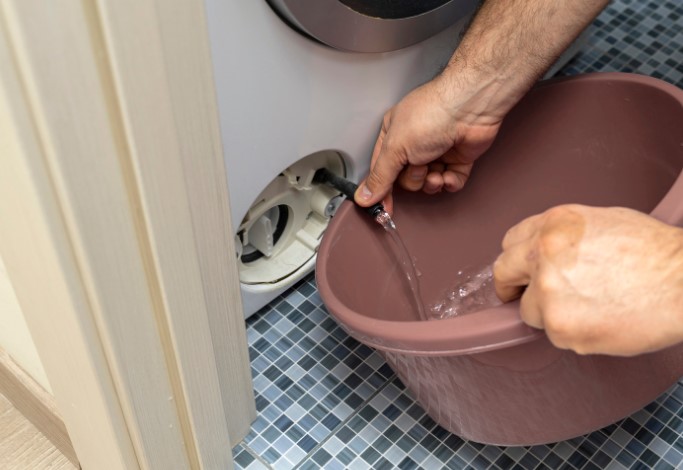
How dirty filters contribute to odours?
- Water and debris build-up: A dirty filter can cause water to back up, leading to stagnant water inside the machine, which encourages bacteria growth.
- Organic material trapped: Lint, hair, and fabric fibres can rot inside the filter, producing foul-smelling gases.
Common types of filters?
- Lint filters: Collect lint and fibres from your clothes during washing.
- Drain pump filter: Catches larger debris to prevent blockages in the drain hose.
How to identify this issue?
- Persistent smell that doesn’t go away, even after cleaning the drum.
- Slower draining or incomplete cycles.
- Visible debris when checking or cleaning the filter.
Reason 6: Dirty Door Seals (Rubber Gasket)
In front-loading washing machines, the rubber door seal (gasket) is a common place where water, soap, and dirt can get trapped. If not cleaned regularly, these seals can develop mould and mildew, which release foul smells.

Why the door seal traps odours?
- Water accumulation: Water often gets trapped in the folds of the rubber seal after a wash cycle. Over time, this moisture combined with dirt can cause mould and bacteria to grow.
- Mould growth: The rubber material itself can harbour mould spores, which thrive in the moist, enclosed environment of the washing machine door.
How to identify this issue?
- Black or grey spots of mould on the rubber seal.
- Strong musty or sulphuric odour when you open the washing machine door.
Reason 7: Poor Ventilation in the Machine
If the washing machine is not aired out properly after each use, moisture remains trapped inside, leading to bacterial growth and bad smells. Poor ventilation is a lesser-known cause of washing machine odours, but it’s equally important to address.
How poor ventilation contributes to smells?
- Trapped moisture: After a wash cycle, it’s essential to leave the door and detergent drawer open to allow air to circulate and dry out the interior. Closing the door too soon locks in moisture, which encourages the growth of bacteria and mould.
- Musty smells: Without proper airflow, the inside of the machine remains damp, allowing bacteria to multiply and produce bad smells.
How to identify this issue?
- Bad smell inside the washing machine when the door is kept closed for long periods.
- Condensation or moisture on the inside of the machine after a wash.
Reason 8: Hard Water and Limescale Build-Up
In areas with hard water, mineral deposits from calcium and magnesium can accumulate inside the washing machine. This limescale build-up not only affects the machine’s performance but also provides a place for bacteria to grow and release bad odours.
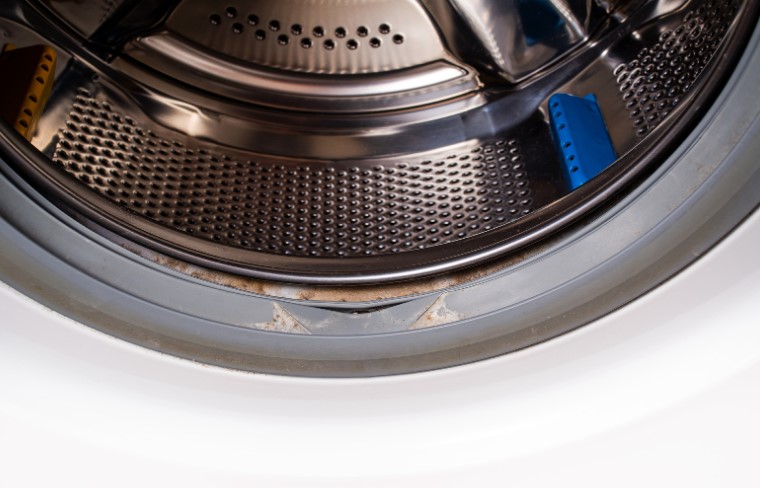
How does hard water affects your washing machine?
- Limescale deposits: Minerals from hard water stick to the heating elements and drum, reducing the efficiency of the machine.
- Trapped bacteria: These mineral deposits can trap detergent and organic matter, creating a fertile environment for bacteria and mould to develop.
Why limescale build-up leads to odours?
- Bacteria can thrive in the nooks and crannies created by limescale deposits, contributing to the rotten egg smell.
- The mineral build-up can also interfere with the machine’s ability to clean clothes effectively, leaving behind detergent residue and dirt.
How to identify this issue?
- Chalky white deposits around the drum or detergent drawer.
- Decreased cleaning efficiency and a lingering smell, even after washing clothes.
Related Article: How to Remove Rotten Egg Smell From Washing Machine?
Conclusion
The rotten egg smell in your washing machine is most likely caused by a combination of factors, such as bacterial growth, stagnant water, detergent residue, and drainage issues.
Understanding these underlying reasons on why does my washing machine smell like rotten eggs can help you tackle the problem effectively. By regularly cleaning your machine, ensuring proper drainage, and maintaining ventilation, you can prevent this unpleasant odour from returning.
If you’re still experiencing the smell after addressing these issues, it may be time to consult a professional to check for deeper mechanical or plumbing problems.

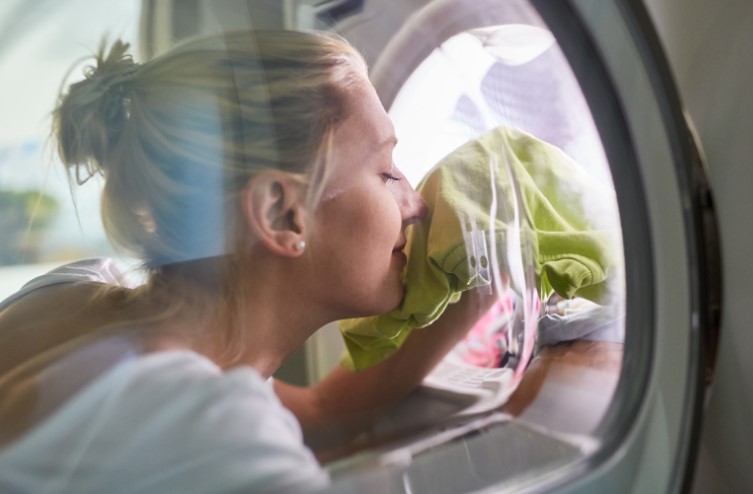
0 Comments